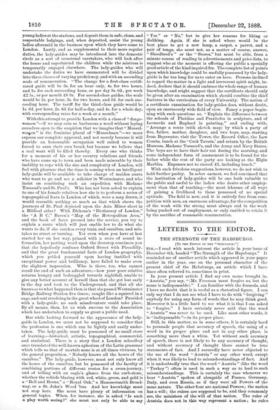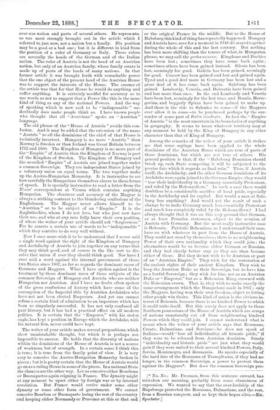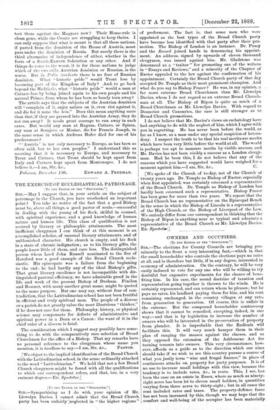LETTERS TO THE EDITOR.
THE STRENGTH OF THE RA.BSBITRGS.
[To THE EDITOR OF THE "SPECTATOR."]
SIR,—I read with much interest the article in your issue of December 6th, headed "The Strength of the Hapsburgs." It reminded me of another article which appeared in your paper earlier in the year, one on the personal character of the present chief of the Habsburgs, an article which I have since often referred to, sometimes in print.
In your present article I find my own name brought in. "Austria," you say, "(Mr. Freeman must forgive us, but the name is indispensable)." I am familiar with the formula, and I have no doubt that it is useful as a rhetorical figure.. I can only say that I do not see what I have to do with "forgiving anybody for using any form of words that be may think good. Moreover it is a little hard to see what it is that I am asked to "forgive." I have certainly never said that the word " Austria " was never to be used. Like most other words, it is "indispensable "—in its proper place.
Still, in this matter, as in some others, it is certainly hard to persuade people that accuracy of speech, the using of a word in its proper place and not in any other place, is something more than a whim. Yet without such accuracy of speech, there is not likely to be any accuracy of thought, and without accuracy of thought there cannot be true statements of fact. And I assuredly have never objected to the use of the word " Austria " or any other word, except when it was likely to lead to misunderstandings of fact. And it is undoubtedly true that the word " Austria " (like the word "Turkey ") often is used in such a way as to lead to such misunderstandings. This is certainly the case whenever we hear " Austria " spoken of alongside of France, Germany, Italy, and even Russia, as if they were all Powers of the same nature. The other four are national Powers; the nation has a will ; the rulers are supposed to be, and they commonly are, the ministers of the will of that nation. The ruler of Austria does not in this way represent a nation ; he rules over one nation and parts of several others. He represEnts, as was most strongly brought out in the article which I referred to just now, not a nation but a family. His position may be a good or a bad one; but it is different in kind from the position of a ruler of Germany or Italy. Those rulers are severally the heads of the German and of the Italian nation. The ruler of Austria is not the head of an Austrian nation, but only of an Austrian family, whose family estate is made up of parts of the lands of many nations. In that former article it was brought forth with remarkable power that the one object of the present head of the Austrian House was to support the interests of the House. The essence of the article was that for that House he would do anything and suffer anything. It is certainly needful for accuracy so to use words as not to suggest that a Power like this is the same kind of thing as any of the national Powers. And the way -of speaking which is now said to be " indispensable " un- doubtedly does make people think so. I have known people who thought that all " Austrians " spoke an Austrian" language.
The old phrase of the "House of Austria" avoids this con- fusion. And it may be added that the extension of the name " Austria " to all the dominions of the chief of that House is technically incorrect. Hungary is no more "Austria" than Norway is Sweden or than Ireland was Great Britain between 1782 and 1800. The Kingdom of Hungary is no more part of the "Empire" of Austria than the Kingdom of Norway is part • of the Kingdom of Sweden. The Kingdom of Hungary and the so-called " Empire " of Austria are joined together under a common Sovereign. They are independent States joined by a voluntary union on equal terms. The two together make up the Austro-Hungarian Monarchy. It is instructive to see how carefully the Hungarians themselves cleave to these forms of speech. It is specially instructive to read a letter from the Times' correspondent at Vienna which contains anything Hungarian. The clearness and accuracy of the Magyar is always a striking contrast to the blundering confusions of the Englishman. The Magyar never allows himself to be "Austrian" or to be subject of an "Empire." It is the Apcglntiachies, whom I do not love, but who just now have their use, and who at any rate fully blow their own position, of whom the writer of your article should ask "forgiveness." For he asserts a certain use of words to be " indispensable " which they contrive to do very well without.
Now I once more wish it to be understood that I never said a single word against the right of the Kingdom of Hungary and Archduchy of Austria to join together on any terms that they may think good, and of course in the like sort to dis- solve that union if ever they should think good. Nor have I .ever said a word againsf the internal government of those two States since 1867, as far as regards the dominant races of Germans and Magyars. What I have spoken against is the treatment by those dominant races of those subjects of the oommon Sovereign of Hungary and Austria who are neither Hungarian nor Austrian. And I have no doubt often spoken of the gross confusions of history which have come of the assumption of the Imperial title by Austrian Archdukes who have not not been elected Emperors. And yet one cannot refuse a certain kind of admiration to an imposture which has been so singularly successful. It has not only confused all past history, but it has had a practical effect on all modern politics. It is certain that the "Emperor," with his stolen .eagle, has kept a position in Europe which the Archduke, with his natural lion, never could have kept.
The writer of your article makes several propositions, which show unmistakable thought, but which it is perhaps not impossible to answer. He holds that the diversity of nations within the dominions of the House of Austria is not a source of weakness, but of strength. In a certain sense I think this is true ; it is true from the family point of view. It is very easy to conceive the Austro-Hungarian Monarchy broken in pieces ; but it is pretty certain that the House of Austria would go on as a ruling House in some of the pieces. In a national Sttite the chances are the other way. Let us conceive either Bourbons or Bnonapartes again reigning in France. The dynasty might at any moment be upset either by foreign war or by internal revolution. But France would revive under some other dynasty or some other form of government. We cannot conceive Bourbon or Bnonaparte losing the rest of the country and keeping either Normandy or Provence at this or that end or the origir al France in the middle. But to the House of Habsburg this kind of thing has repeatedly happened. Hungary and Austria have, save for a moment in 1848-49, stayed together during the whole of this and the last century. But nothing has been more shifting than the tenure of what, in Hungarian phrase, we may call the perks annexze. Kingdoms and Duchies have been lost ; sometimes they have come back again ; sometimes others have been gained instead. Silesia has been lost, seemingly for good. Galicia has been gained, seemingly for good. Cracow has been gained and lost and gained again. Tyrol and a good deal more in Germany has been lost and a great deal of it has come back again. Salzburg has been gained. Lombardy, Venetia, and Dalmatia have been gained and lost more than once. In the end Lombardy and Venetia have been lost, seemingly for the last time, and Bosnia, Herze- govina, and beggarly Spizza have been gained to make up. And there is the ride to Salonica to come—if the Magyars ever allow it to come—to be purchased perhaps by the sur- render of some part of Italia irredenta. In fact the "Empire of Austria" is the most uncertain in its boundaries of anything in geography. It seems to mean whatever territory may at any moment be held by the King of Hungary in any other character than that of King of Hungary.
Among the remarks of the writer of your article it strikes me that some sayings have been applied to the whole dominions of the Austrian House which are true of parts of those dominions, but which are not true of others. His general position is that, if the "Habsburg Dominion should break up, each State composing it will be subjected to the precise fate which it regards as final ruin." Thus, if Austria itself, the Archduchy, and the other German dominions of its Archduke were again joined to the German Empire, they would "lose their individuality in a Germany essentially Protestant, and ruled by the Hohenzollern." In such a case there would doubtless be a considerable sacrifice of local pride, especially in the Archduchy and its capital. But would a man at Salz- burg lose anything ? And would not the result of such a change be to make Germany much less essentially Protestant and much less completely ruled by the Hohenzollern ? 1 had always thought that it was on this very ground that German, or at least Prussian statesmen, object to the reunion of Austria with Germany. But the most really instructive case is Bohemia. Patriotic Bohemians, as I understand their case, have no wish whatever to part from the House of Austria. They could not stand by themselves ; there is no neighbouring Power of their own nationality which they could join ; the alternatives would be to become either German or Russian, and they had clearly better stay as they are than become either of those. But they do not wish to be Austrian or part of an "Austrian Empire." They wish for the restoration of the ancient rights of their ancient Kingdom. They wish to keep the Austrian Duke as their Sovereign, but to have him as a lawful Sovereign ; they wish for him, not as an Austrian Duke or "Emperor," but as a Bohemian King, crowned with the Bohemian crown. That is, they wish to make exactly the same arrangement which the Hungarians made in 1867; only the Magyars, having won their own freedom, object to letting
other people win theirs. This kind of union is the obvious in- terest of Bohemia, because there is no kindred Power to which it could unite itself. But this surely does not apply to those Southern possessions of the House of Austria Which are scraps of nations unnaturally cut off from neighbouring kindred
Powers which they could join. I cannot understand what is
meant when the writer of your article says that Roumans, Croats, Dalmatians, and Servians—he does not speak of Italians—would "lose all individuality, all historic pride," if they were to be released from Austrian dominion. Surely "individuality and historic pride" are just what they would gain if they were united to their several kindred Powers, Italy, Servia, Montenegro, and Roumania. He speaks especially of the hard fate of the Roumans of Transylvania, if they had no longer, in the common Sovereign, a power to protect them against the Magyars*. But does the common Sovereign pro-
[* No, No; Mr. Freeman, from this sentence onward, has mistaken our meaning, probably from some clumsiness of expression. We wanted to say that the over-lordship of the Hapsburgs protected the Roumans, Dalmatians, and the rest, from a Russian conquest, and so kept their hopes alive.—ED. Spectator.] tect them against the Magyars now ? Their Home-rule is clean gone, while the Croats are struggling to keep theirs. I can only suppose that what is meant is that all these nations, if parted from the dominion of the House of Austria, must pass under the dominion of Russia. But surely there is the third alternative of independence of either, whether in the form of a South-Eastern federation or any other. And if things do come to the worst, it is for those nations to judge which of the two evils, Austrian dominion or Russian, is the worse. But in ralia irredentct there is no fear of Russian dominion. What "historic pride" would Trent lose by becoming part of the Kingdom of Italy ? And, to go back beyond the Hadriatic, what "historic pride" would a man at Cattaro lose by being joined again to his own people and his natural Prince, from whom he has been so basely torn away?
The article says that the subjects of the Austrian dominion will "complain of it, enjoy satires on it, even riot against it, and die for it none the less." Does this mean anything more than that, if they are pressed into the Austrian Army, they do not run away ? It needs great courage to run away in such cases. But would any man at Ragusa, Cattaro, or Spizza, any man at Serajevo or Mostar, die for Francis Joseph, in the same sense in which Andreas Hofer died for one of his predecessors ?
" Austria ' is not only necessary to Europe, as has been so often said, but to her own peoples." I understand this as meaning that it is necessary to Europe, and necessary to Trent and Caftan:), that Trent should be kept apart from Italy and Cattaro kept apart from Montenegro. I do not believe it.—I am, Sir, &c.,












































 Previous page
Previous page